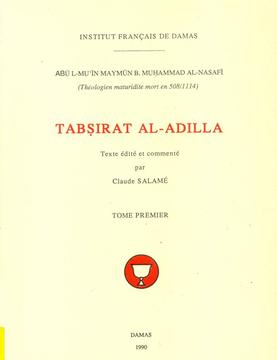
Sunni Islam is the largest denomination of Islam, followed by 85–90% of the world's Muslims, and simultaneously the largest religious denomination in the world. The word Sunni refers to those who observe the Sunnah, referring to the traditions and practices of Muhammad. The differences between Sunni and Shia Muslims arose from a disagreement over the succession to Muhammad and subsequently acquired broader political significance, as well as theological and juridical dimensions. According to Sunni traditions, Muhammad left no successor and the participants of the Saqifah event elected Abu Bakr as the first caliph. This contrasts with the Shia view, which holds that Muhammad appointed his son-in-law and cousin Ali ibn Abi Talib as his successor.
Ilm al-kalam or ilm al-lahut, often shortened to kalam, is the scholastic, speculative, or rational study of Islamic theology (aqida). It can also be defined as the science that studies the fundamental doctrines of Islamic faith, proving their validity, or refuting doubts regarding them. Kalām was born out of the need to establish and defend the tenets of Islam against the philosophical doubters. A scholar of kalam is referred to as a mutakallim, a role distinguished from those of Islamic philosophers and jurists.
Shams ad-Dīn adh-Dhahabī, also known as Shams ad-Dīn Abū ʿAbdillāh Muḥammad ibn Aḥmad ibn ʿUthmān ibn Qāymāẓ ibn ʿAbdillāh at-Turkumānī al-Fāriqī ad-Dimashqī was an Athari theologian, Islamic historian and Hadith scholar.

Abū Bakr is an Arabic given name meaning "Father of a Young Camel" that is widely used by Sunni Muslims.

Ibn Ḥajar al-ʿAsqalānī, or simply ibn Ḥajar, was a classic Islamic scholar "whose life work constitutes the final summation of the science of hadith." He authored some 150 works on hadith, history, biography, exegesis, poetry, and the Shafi'i school of jurisprudence, the most valued of which being his commentary of Sahih al-Bukhari, titled Fath al-Bari. He is known by the honorific epithets Hafiz al-Asr "Hafiz of the Time", Shaykh al-Islam "Shaykh of Islam", and Amir al-Mu'minin fi al-Hadith "Leader of the Believers in Hadith".
Al-Andalusi is an Arabic-language surname common in North African countries that literally means “the Andalusian”, and it denotes an origin or ancestry from al-Andalus or from the modern-day region of Andalusia. Andalusian culture was heavily influenced by Syrian Arab culture, and most Arab tribes present in al-Andalus had a Syrian or Yemeni origin. Al-Andalusi may refer to:
Najm ad-Dīn Abū Ḥafṣ 'Umar ibn Muḥammad an-Nasafī was a Muslim jurist, theologian, mufassir, muhaddith and historian. A Persian scholar born in present-day Uzbekistan, he wrote mostly in Arabic.
Burhān ad-Dīn Ibrāhīm ibn Muḥammad ibn Ibrāhīm al-Ḥalabī was an Islamic jurist (faqīh) who was born around 1460 in Aleppo, and who died in 1549 in Istanbul. His reputation as one of the most brilliant legists of his time chiefly rests on his work entitled Multaqā al-Abḥur, which became the standard handbook of the Ḥanafī school of Islamic law in the Ottoman Empire.
Abu al-Mu'in al-Nasafi was a Central Asian Hanafi scholar who is considered to be the most important theologian in the Maturidi school of Sunni Islam after Imam Abu Mansur al-Maturidi, provided a fairly detailed account of al-Maturidi Central Asian predecessors.

Tabsirat al-Adilla fi Usul al-Din: 'ala Tariqat al-Imam Abi Mansur al-Maturidi, better known as Tabsirat al-Adilla, is considered as the second most important kalam book of the Maturidite school, after Kitab al-Tawhid of al-Maturidi himself, composed by Abu al-Mu'in al-Nasafi.
Abu al-Yusr al-Bazdawi (c.1030-c.1100), who was given the honorific title of Sadr al-Islam, was a prominent Central Asian Hanafi-Maturidi scholar and a qadi (judge) in Samarqand in the late eleventh century. He was a teacher to several well-known Hanafi scholars, such as Najm al-Din 'Umar al-Nasafi and 'Ala' al-Din al-Samarqandi.
Jamal al-Din al-Ghaznawi, was a Sunni Hanafi jurist, theologian, and Kalam scholar of the Maturidi school.
Abu al-Barakat al-Nasafi, was an eminent Hanafi scholar, Qur'an exegete (mufassir), and a Maturidi theologian. He is perhaps best known for his Tafsir Madarik al-Tanzil wa Haqa'iq al-Ta'wil.
Abu al-Hasan 'Ali ibn Muhammad al-Bazdawi, known with the honorific title of Fakhr al-Islam, was a leading Hanafi scholar in the principles of Islamic jurisprudence. He is author of the acclaimed Kanz al-Wusul ila Ma'refat al-Usul, popularly known as Usul al-Bazdawi, a seminal work in Hanafi Usul al-Fiqh.
This page is based on this
Wikipedia article Text is available under the
CC BY-SA 4.0 license; additional terms may apply.
Images, videos and audio are available under their respective licenses.



